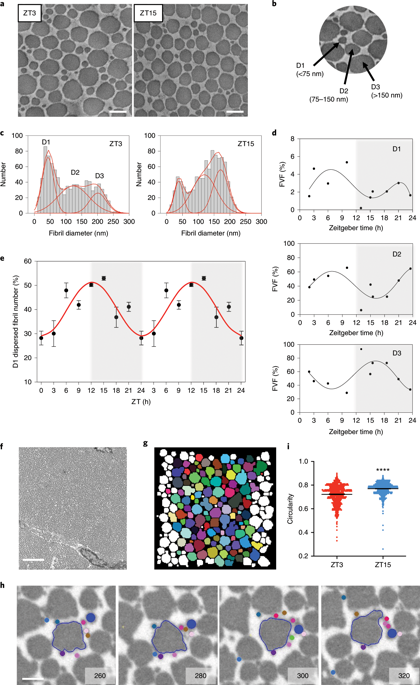Nature Cell Biology ( IF 17.3 ) Pub Date : 2020-01-06 , DOI: 10.1038/s41556-019-0441-z Joan Chang 1 , Richa Garva 1 , Adam Pickard 1 , Ching-Yan Chloé Yeung 1, 2 , Venkatesh Mallikarjun 1 , Joe Swift 1 , David F Holmes 1 , Ben Calverley 1, 3 , Yinhui Lu 1 , Antony Adamson 1 , Helena Raymond-Hayling 1, 3 , Oliver Jensen 3 , Tom Shearer 3 , Qing Jun Meng 1 , Karl E Kadler 1

|
Collagen is the most abundant secreted protein in vertebrates and persists throughout life without renewal. The permanency of collagen networks contrasts with both the continued synthesis of collagen throughout adulthood and the conventional transcriptional/translational homeostatic mechanisms that replace damaged proteins with new copies. Here, we show circadian clock regulation of endoplasmic reticulum-to-plasma membrane procollagen transport by the sequential rhythmic expression of SEC61, TANGO1, PDE4D and VPS33B. The result is nocturnal procollagen synthesis and daytime collagen fibril assembly in mice. Rhythmic collagen degradation by CTSK maintains collagen homeostasis. This circadian cycle of collagen synthesis and degradation affects a pool of newly synthesized collagen, while maintaining the persistent collagen network. Disabling the circadian clock causes abnormal collagen fibrils and collagen accumulation, which are reduced in vitro by the NR1D1 and CRY1/2 agonists SR9009 and KL001, respectively. In conclusion, our study has identified a circadian clock mechanism of protein homeostasis wherein a sacrificial pool of collagen maintains tissue function.
中文翻译:

分泌途径的昼夜节律控制维持胶原蛋白稳态
胶原蛋白是脊椎动物中最丰富的分泌蛋白,并且会在整个生命中持续存在而不会更新。胶原蛋白网络的持久性与整个成年期胶原蛋白的持续合成以及用新拷贝替换受损蛋白质的传统转录/翻译稳态机制形成鲜明对比。在这里,我们通过 SEC61、TANGO1、PDE4D 和 VPS33B 的顺序节律性表达显示内质网到质膜前胶原转运的生物钟调节。结果是小鼠夜间的前胶原合成和白天的胶原原纤维组装。CTSK 的节律性胶原蛋白降解可维持胶原蛋白稳态。这种胶原蛋白合成和降解的昼夜循环会影响新合成的胶原蛋白池,同时保持持久的胶原蛋白网络。禁用生物钟会导致异常的胶原原纤维和胶原积累,在体外分别由 NR1D1 和 CRY1/2 激动剂 SR9009 和 KL001 减少。总之,我们的研究已经确定了蛋白质稳态的生物钟机制,其中牺牲的胶原蛋白池维持组织功能。





























 京公网安备 11010802027423号
京公网安备 11010802027423号